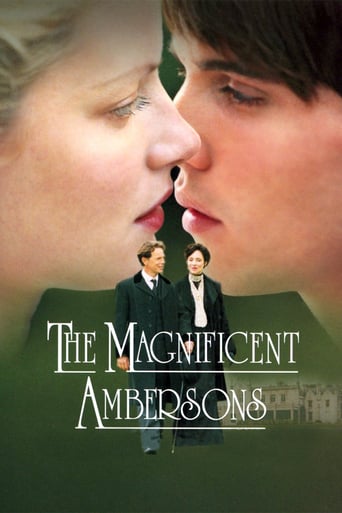

This clumsy catastrophe is NOT made from Orson Welles' screenplay for his genius 1942 version, though it uses bits of it. The creators of this remake do everything wrong. The unforgettable prologue and narration are dropped entirely, important scenes are cut to make room for stupid new ones, others are shuffled and rewritten so they no longer make sense, and banal, foolish dialog is added.Tarkington's story is deeply grounded in a particular time and place: a century ago in the American midwest. Welles, a midwesterner born in 1915, knew the place and the people well. This version's Mexican director, Alfonso Arau, shows so little understanding of his characters and story, you wonder if he's ever met an American.Arau's choice of an isolated Irish country house to stand in for the Ambersons' urban mansion, located near the downtown of a city based on Tarkington's native Indianapolis, shows how clueless he is. That's like filming HUCKLEBERRY FINN in Vienna, with the Danube as the Mississippi.Every choice is as wrong as the mansion. There is no sense of place or period. All of the leads are grossly miscast. The speech, the manners, the attitudes, the tone, the bad acting, the cheap suggestions of incest ... nothing in this remake rings true.For George Minafer, the most American of protagonists, Arau weirdly goes to Ireland again, casting the amateurish Jonathan Rhys Meyers, who overacts like crazy in a phony, inappropriately-contemporary accent. Where Tim Holt was subtle and low-key, Rhys Meyers shouts, leaps about, and twists his pretty lips into sneers and scowls worthy of a circus clown.Granted, the 1942 cast was perfection. Arau's casting makes you wonder what he was smoking. Madeleine Stowe is nothing like Isabel, but she comes off better than most of the others. Morgan is the bland Bruce Greenwood, whose wrongness reminds one how profoundly sensitive and right Joseph Cotton was in the part. Major Amberson looks and talks like an ex-hippie; and the frail, sexless Wilbur is played by a handsome, hearty actor who has way more sex appeal than Greenwood, which makes nonsense of the love triangle.In the crucial role of Fanny -- the prim, plain-faced, repressed spinster aunt -- Arau casts (I am not making this up!) the vulgar, sexy Jennifer Tilly. Agnes Moorhead, heartbreakingly memorable in the Welles version, is rolling in her grave.When Arau tries to get arty, he falls right on his face ... turning George's birth into a 1960s acid trip and adding an absurd scene to the ball sequence, where Morgan waltzes with Isabel in the snow while two butlers try to hold parasols over their heads. This sub-Fellini touch is so idiotic, like much of the movie, it becomes unintentionally funny. Blunder piles on blunder. Isabel, Fanny, and George all appear to have collagen-injected lips, which sums up director Arau's apparent belief that Indiana in 1900 was exactly like Beverly Hills today. The dancers at the ball do the tango (!) as if the story's set in Buenos Aires. Nothing here seems to be happening in the United States, let alone Indiana.If you know the novel or Welles' flawless, if studio-mangled, adaptation, you will shake your head in amazement: how could this remake turn such wonderful material into such an embarrassing train wreck for all concerned?PLEASE don't let this inept, tone-deaf mess be your only acquaintance with THE MAGNIFICENT AMBERSONS. See the brilliantly written and directed, perfectly acted Welles version or read Tarkington's masterful Pulitzer Prize-winning novel.
... View MoreI'd always heard that "The Magnificent Ambersons" was Orson Welles' masterpiece, but had never seen it until I got the two versions out of the public library. Now I'm even MORE curious about both the novel and Welles' screenplay. Welles' may have been ahead of his time cinematically, but the current version lacks bite largely because the storyline is outdated.Lacking a narrative voice-over, the remake presents events and motivations more clearly through visuals and dialogue. I thought the new casting was near-perfect in terms of character types, and the settings were visually stunning. In th A&E version the viewer comes to mourn the loss of old- time aristocratic splendor, which in the Welles' version has a vaguely Gothic feel. Both versions, however, fail to absorb the viewer emotionally completely. Georgie definitely deserves a comeuppance, but neither version carries the full impact or allows the characters to grow to tragic stature.
... View MoreI had watched Welles' original more than a few times, and so approached this 'made-for-tv' attempt with much apprehension. I was pleasantly surprised at the lush cinematic treatment and the superior acting. The treatment of the mother to her spoiled child gave just the right hint of their unhealthy and unconscious Oedipal situation; the mother even lying in bed in a black nightgown. I remain confused as to why the majority of bad reviews. Half the critics indicate the story is a "downer," but that IS THE STORY! You can see why Rys is tapped for the lead in Woody Allen's Match Point years later, and I recommend this film for anyone capable of enjoying objectively a well-made piece of film, and not pining away for the "happy ending" you've been taught to expect.
... View MoreI went back and watched this movie for a 3rd time. I do not see anything bad to comment on about it. Rubbish it's not. I see a truly unique film here. It is rather odd which I enjoy. And, JRM, portrays characters like Georgie to perfection. The whole cast played their parts well. As I mentioned before nothing is perfect in any film, but Myers is in his role here. His character really angered me at times, but hey isn't that what a movie is suppose to do? Evoke our emotions? I loved the movie. Worth watching 3 times.
... View More